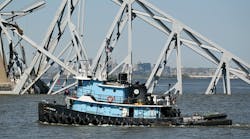When Sen. Jim Jeffords of Vermont staged his recent ‘coup of one,’ he changed the balance of power in the Senate to favor the Democrats for the first time since 1995. By changing his party affiliation from Republican to Independent, he gave the Democrats a one-seat majority, which will affect all legislative issues — including trucking. But how?
Jim Wittinghill, lobbyist for the American Trucking Assns., sees little effect. “How much difference will it make? Not a whole lot,” he says. Because the Senate needs a majority to amend bills, the numbers remain largely the same. Wittinghill adds: “Once things get settled it will become apparent that the results will be the same.”
Others disagree. One trucking industry official noted that on emotional issues like OSHA's ergonomics rules, the newly configured Senate might be less likely to overturn an agency's ruling.
In a prepared statement, Walter McCormick Jr., outgoing ATA president and CEO, said of the Senate changes: “ATA's strategy will not change. We will continue to work in a bipartisan manner to aggressively advocate for what is in the best interest of our members and the trucking industry.” (McCormick is leaving ATA to become president and CEO of the United States Telecom Assn., a trade group representing the interests of telephone companies.)
Although the impact of one vote change is debatable, the majority does set the agenda and decide leadership roles, and these small changes can have significant consequences. For example, Jeffords is expected to take over the chairmanship of the Environment and Public Works Committee from Republican Sen. Bob Smith of New Hampshire, replacing a conservative point of view with a more moderate one. This committee will oversee the EPA and issues such as engine emissions and handling hazardous materials.
Also looking at energy issues is the Energy and Natural Resources Committee, which will change from Alaska's Republican Frank Murkowski to New Mexico Democrat Jeff Bingaman. Bingaman has proposed price caps on electricity, a move seen as positive for most businesses, but he opposes oil drilling in untouched Arctic lands.
Sen. Ernest Hollings (D-SC) will replace Republican John McCain of Arizona at the Commerce, Science and Transportation Committee, which oversees the Dept. of Transportation. The more moderate Hollings will set the tone on NAFTA issues. Republicans often favor wholesale opening of the border, while Democrats have been more wary of unresolved safety and inspection issues.
Most important may be the change in the Appropriations Committee's Subcommittee on Transportation. Senator Richard Shelby (R-AL), who helped stop implementation of hours-of-service reform, will be replaced as chairperson by Sen. Patty Murray (D-WA).
Another area to watch is judicial appointments. President Bush will be forced to send up more moderate appointments because the Democrats, now in charge of the Judiciary Committee, will be able to stall any appointees they consider too conservative.
We mustn't overlook the effect of Jeffords' defection in terms of the message it sends to lawmakers and President Bush that the Republican agenda may be out of step with what most people and businesses want. It's an indication to many that their policies are too conservative for most Americans, who prefer a more middle-of-the-road and cooperative approach to governing.
Jeffords' defection came at a pivotal time for Bush's energy and environmental policies, which many Americans see as detrimental to the environment, short on conservation and lacking any long-term fixes. They also point to Bush's snubbing of the Kyoto Protocol, which would lower worldwide levels of greenhouse gases.
It is clear from Jeffords' defection and Bush's recent setback in the polls that the nation wants moderation in regulation and legislation. Whether other lawmakers heed the warning, and whether or not President Bush and the federal agencies under his control understand this message remains to be seen.


